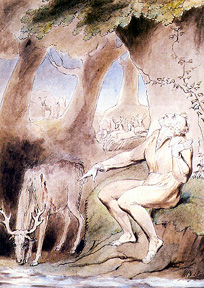 Pen and watercolor on paper, approximately 8.5 x 6 inches. The British Museum, London.
Pen and watercolor on paper, approximately 8.5 x 6 inches. The British Museum, London.
 Pen and watercolor on paper, approximately 8.5 x 6 inches. The British Museum, London.
Pen and watercolor on paper, approximately 8.5 x 6 inches. The British Museum, London.
The Reverend Joseph Thomas owned a copy of the second edition (1632) of Shakespeare's Folio, and he commissioned several artists to furnish him with illustrations to insert into his copy of the plays. William Blake, who had earlier rendered eight illustrations for a copy of Milton's Comus owned by Thomas, was asked to paint six pictures for the Folio. Besides Jaques and the Wounded Stag, Blake contributed these illustrations as well: Richard III and the Ghosts (c. 1806-09), Queene Katherine's Vision (1809), Brutus and the Ghost of Caesar (1806), Hamlet and His Father's Ghost (1806), andAn Angel Vaulting from a Cloud (1809)
The other artists--John Flaxman, William Varley, William Hamilton, Robert Porter and William Mulready--contributed another thirty illustrations of the plays.
Blake's painting depicts a scene from As You Like It that is only described for us in the play. In Act II, Scene i, the Duke considers hunting deer in Arden, but his tender feelings for the animals give him pause:
First Lord
Duke Senior
First Lord
Duke Senior
Second Lord
Come, shall we go and kill us venison?
And yet it irks me the poor dappled fools,
Being native burghers of this desert city,
Should in their own confines with forked heads
Have their round haunches gored.Indeed, my lord,
The melancholy Jaques grieves at that,
And, in that kind, swears you do more usurp
Than doth your brother that hath banish'd you.
To-day my Lord of Amiens and myself
Did steal behind him as he lay along
Under an oak whose antique root peeps out
Upon the brook that brawls along this wood:
To the which place a poor sequester'd stag,
That from the hunter's aim had ta'en a hurt,
Did come to languish, and indeed, my lord,
The wretched animal heaved forth such groans
That their discharge did stretch his leathern coat
Almost to bursting, and the big round tears
Coursed one another down his innocent nose
In piteous chase; and thus the hairy fool
Much marked of the melancholy Jaques,
Stood on the extremest verge of the swift brook,
Augmenting it with tears.But what said Jaques?
Did he not moralize this spectacle?O, yes, into a thousand similes.
First, for his weeping into the needless stream;
'Poor deer,' quoth he, 'thou makest a testament
As worldlings do, giving thy sum of more
To that which had too much:' then, being there alone,
Left and abandon'd of his velvet friends,
''Tis right:' quoth he; 'thus misery doth part
The flux of company:' anon a careless herd,
Full of the pasture, jumps along by him
And never stays to greet him; 'Ay' quoth Jaques,
'Sweep on, you fat and greasy citizens;
'Tis just the fashion: wherefore do you look
Upon that poor and broken bankrupt there?'
Thus most invectively he pierceth through
The body of the country, city, court,
Yea, and of this our life, swearing that we
Are mere usurpers, tyrants and what's worse,
To fright the animals and to kill them up
In their assign'd and native dwelling-place.And did you leave him in this contemplation?
We did, my lord, weeping and commenting
Upon the sobbing deer.